Wylliams / Henry Contemporary Dance Company
May 2010 Concert
www.wylliams-henry.org
Fri/Sat 21, 22 May 2010, 8pm, Performing Arts Center, Spencer Theater, 4949 Cherry (UMKC), Kansas City, Missouri
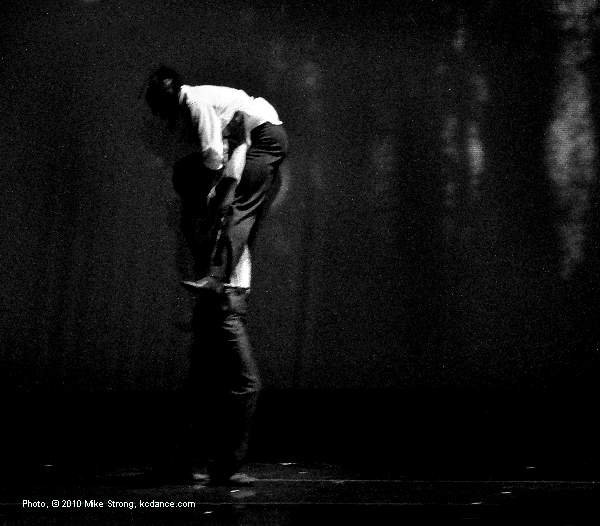
Torens Johnson as the friend in mortal danger, being hunted
down, and here, beaten and thrown around. - Southern Exposure by Mary Pat
Henry
Mary Pat Henry brought out a new piece, "Southern Exposure" - a narrative in 10 scenes - for the Spring 2010 concert. It is about growing up in the south and integration in the time of Jim Crow. In some ways it resembles her earlier piece on the advent of WWII, Soiree in which the sophisticated party atmosphere of an urbane Europe runs a conterpoint to the developing cloud of Nazi evil. In this new piece the counterpoint is between "social graces and racial prejudice." It is semi-autobiographical.
The piece begins with innocent play and dancing which comes into direct conflict with personal racial hatreds and violence. A narrator reads text which belongs to the memories of Mary Pat, who grew up in South Carolina. This is an evocative piece and it is hard to miss the sense of lost opportunities still dogging us from the far past. I hesitate to say this is a painful piece because you might decide to pass it by. But I should note that this brought up memories for from long ago and layered old pains of seeing friends hurt for no more reason than being in a named "category."
There is painful loss as our narrator's friend (portrayed by Torens Johnson) is murdered. "Southern Exposure" is something other than a pure dance piece. It is a theatrical narrative, partly story and partly sequenced impressions which hang together in an event timeline. Even though this is a 30-minute piece it feels more like a 5-minute piece, in major part because of the sense of a story which occupies your attention.
I knew this was going to be a wrenching piece from the first time I saw it in studio during early rehearsals. There was such a sweet feeling to the young friendship coupled with such an emotional grab when their friendship is pushed away by racial attitudes (you don't belong with us, with her) and then by personal development as they grow older, straining the connection, limiting conversations and driving the still-strong affections to the background. The narration tells us that her friend gets into the Black Power movement. I remember when my friend Bobby Adams was into Black Power and asked me to call him "black" and not "negro." At the time "negro" was still a polite or respectful word though it has come to mean something like an Uncle Tom. I had avoided using "black" as a noun because I mistook it for "blackie" which I thought was a terrible word, kind of a minor version of the big-n word.
I remember 1964 and the Civil Rights Bill. I, very naively, thought, "It's all fixed now." 46 years later I am still wondering when we will get over it and get on with it. How many more friendships will still be carefully tended but hidden. In my small town there were no black people, and I think that is still the case. Not until I could join the Civil Air Patrol at 13 did I meet kids who were black. That was in late 1960.
But my grandfather made sure I knew about civil rights struggles, Dr. Carver, Du Bois, Turner and others. As a small child I was loaded with books. My grandfather told me that his father, Frank Devine, wore a gun because of death threats for having started a school for blacks in Maysville, KY. Unfortunately that is about all I learned of my great-grandfather. It would have been in the 1880s or 1890s by my best guess, maybe the early 1900s. He was born in 1848 and brought over here from Ireland that year. Irish were new immigrants and very unwelcome. He became the leader of the Knights of Columbus in Maysville. Apparently he saw something in his experience as an unwanted Irishman which provided him with reasons to reach out. He was ready to fight, said my grandfather of his father.
As I watched run-throughs and performances of Mary Pat's piece I caught myself wondering about my great-grandfather's world and the smiling threats all around. They killed people back then for the social crime of learning, if you were the "wrong" color.
I thought of other discriminations, some largely invisible. My mother was a divorced Catholic. My life was only a little affected until 3rd grade when she re-married and put me in Catholic school. In the first few weeks I learned that we were condemned and that I had a mark of Caine. Everyone else could tell that about me even though I could not literally see it. I don't wish to dwell on this except to note that Mary Pat Henry's "Southern Exposure" brought out the history of anyone who came to see it. For me when I saw Toren's character being pulled away from Carol's character I grabbed at my self and felt sharp pain for their friendship even though our specific reasons were different, theirs racial, mine religious. Classifying and rejecting people on the basis of declared categories. Perhaps that is what moved my great grandfather.
And I was not the only person who brought their own history to "Southern Exposure." I talked to people who said they cried during the performance,sometimes more than they had in years, at their own memories activated by Mary Pat's piece. That is power.
It is also a complicated piece technically with video, stills, theater, actors, voice-over, dancers and more. There are a large number of William Christenberry photos of The South which are projected on the background. Mary Pat received the permission to use them from Christenberry as a result of their earlier relationship with the late Myra Morgan whose Morgan Gallery in the River Market first exhibited Christenberry and then became a major buyer of his work.
Today, that collection is part of the Belger Arts Center in Kansas City which has the largest collection of Christenberry work in the country. Large enough that the work goes out to galleries as part of its touring collection, which is large enough that Belger can send out several such touring packages at a time (http://www.belgerartscenter.org/touring_catalog/williamchristenberry.php).
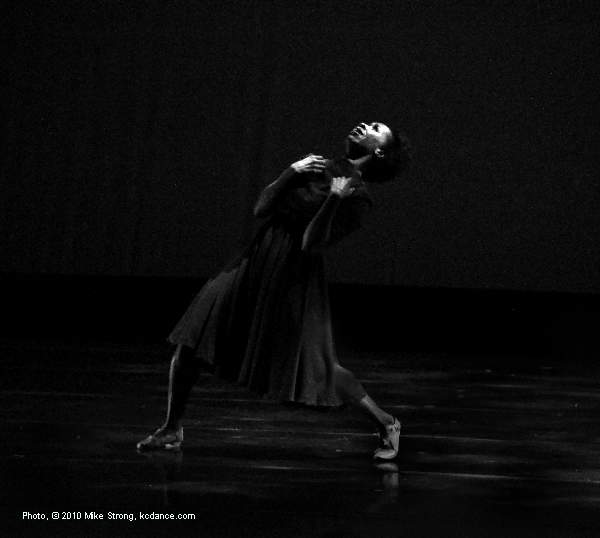
Tracey Franklin as mother in grief at her son's murder
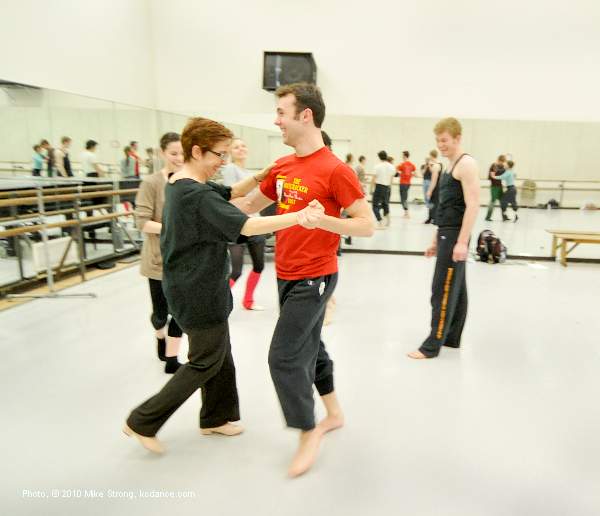
Mary Pat Henry shows Erik Sobbe how the kids danced in the
60's - Rehearsal for Southern Exposure
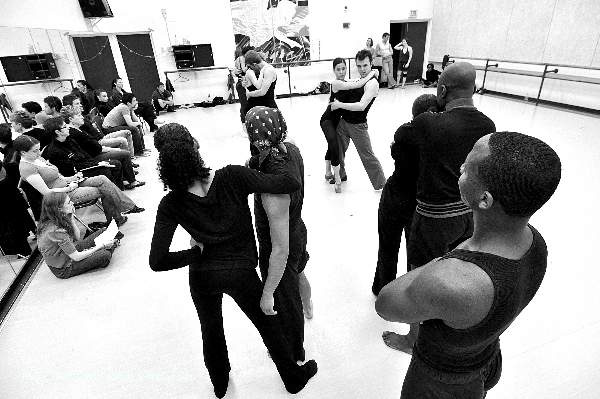
White "kids" and black "kids" form opposing
groups during this studio rehearsal run through for Southern Exposure.
Sitting of the floor is the actor/narrator. Sitting on the bench, second from
left is Mary Pat Henry, whose recollections form a large part of this piece.
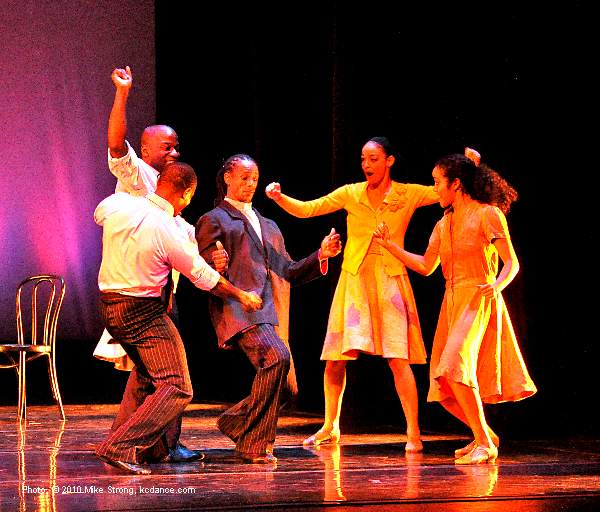
Rodni Williams in Southern Exposure on the black side of the
social stage dancing with (l-r) Chris Peacock, Telly Fowler, Chloe Abel, Asha
Singh
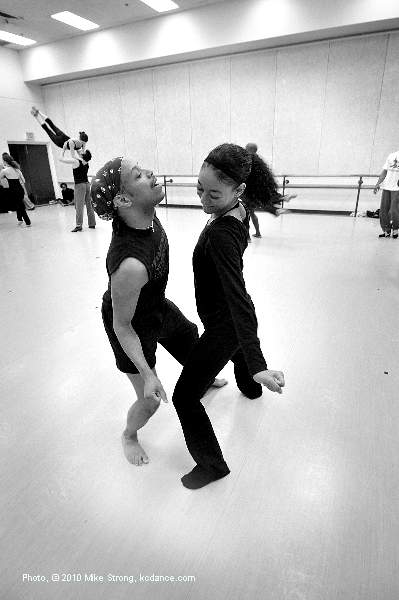
Torens Johnson and Chloe Abel in Southern Exposure - aerial
lift in the background Kathleen Turner and Tracy Kofford
Moore in Time by Mary Pat Henry - (outside ring from left and around) Tracy Kofford, Telly Fowler, Erik Sobbe, Michael Tomlinson -
(inside ring from left and around) Brittany Duskin, DeeAnna Hiett, Kathleen Turner, Carolina Monnerat
Skyler Taylor and Gavin Stewart in Southern Exposure by Mary Pat Henry. On the right Erik Sobbe and Kelanie Murphy
Moore In Time - by Mary Pat Henry
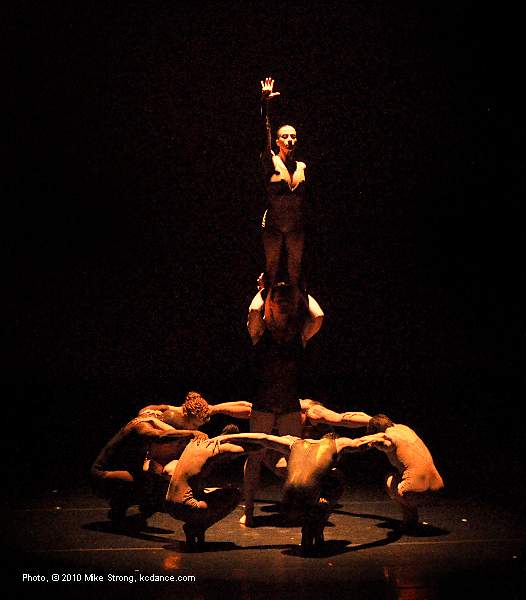
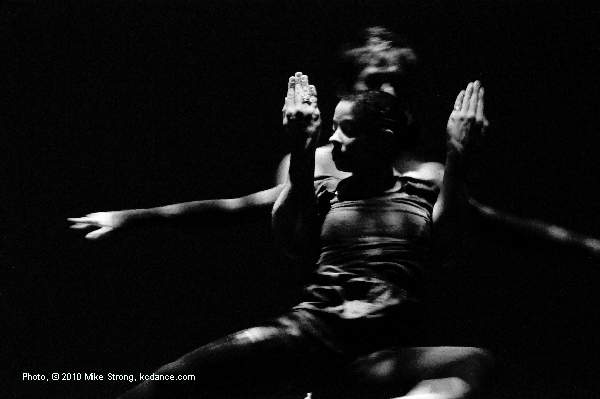
Kathleen Turner (front) and Tracy Kofford in Moore in Time
- during the first tech rehearsal, in work togs (no costumes yet)
Along with that is a production of Moore In Time with a slight re-working in terms of number of dancers, projections and lighting. It is a visually rich piece in which pictures of Moore's sculptures are projected behind dancers who mirror and emulate those same sculptures. The music of Tan Dun gives Moore In Time an exotic flavor. This time the lighting is a tad brighter making it an easier piece to see - though I retain my usual complaints about light (below). This is almost as if the sculptures came to life for us moving in and out of the light.
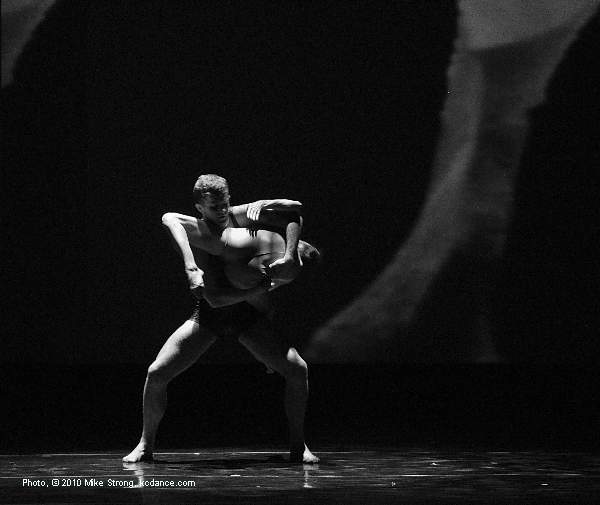
Michael Tomlinson carrying DeeAnna Hiett as statues in front
of projections of Moore statues in Moore In Time
Chloe-Christina - by Ruth Barnes
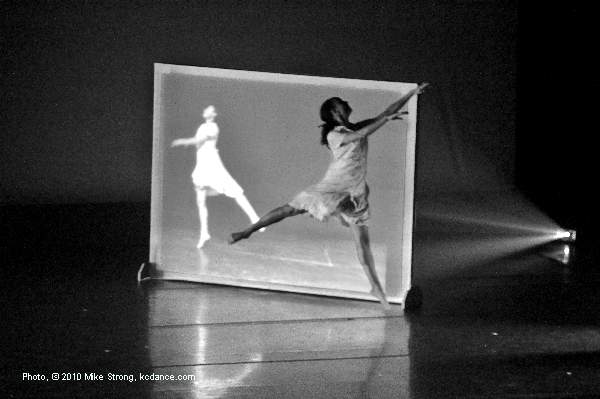
Chloe-Christina is a piece customized to each dancer by Ruth Barnes (assistant professor of dance at Missouri State - http://theatreanddance.missouristate.edu/facultyprofile.asp?ID=3 or her blog at: http://ruthbarnes.blogspot.com ). Barnes has been mixing live dance and video for some years now.
Chloe-Christina is Barnes' working of the Andrew Wyeth painting Christina's World. (see wiki: http://en.wikipedia.org/wiki/Christina's_World ) The original painting was inspired by Wyeth's glimpse of Christina Olson crawling across a field. Christina had a muscular deterioration which paralized her lower body. Wyeth did not use Olson as a model for everything, using his wife, instead for the upper body.
In the Ruth Barnes piece each version uses video of the soloist, in this case Chloe Abel and names the piece for the first name of the dancer followed by "-Christina" making this performance of the piece "Chloe-Christina." Chloe Abel starts in the position of the Christina in the painting and as the video of herself plays, dances to and around it, sometimes in front of the rear-projection screen and sometimes behind causing her own shadow to play across the video of herself. She moves into and out of the frame.
At this point the concept of dancing onstage to projected video is getting pretty long in the tooth as a gimmick. I have to admit to a little eye rolling myself. But, despite my initial reaction, the more I watched the more I appreciated the nuance and delicacy that Chloe Abel brought to what was a very confined canvas, both physically and conceptually.
The rear-projection screen was on the audience' right and smallish with the projector behind it. At times Chloe paired her movements with her video presence and at other times she danced either a counterpoint to her video performance or danced a direct challege to it, framing or obscuring the projection by dancing between the projector and the screen, then returning to the front.
Update Note 10 June 2010 - I still catch myself thinking about this piece, the one I originally thought I would find forgetful because the video/live performance duet idea has become so cliché. Well, gimmick or not, the delicate under tones in the piece and the performance seem to be what being me back to this in my thoughts.
Desire - by Gary Abbott
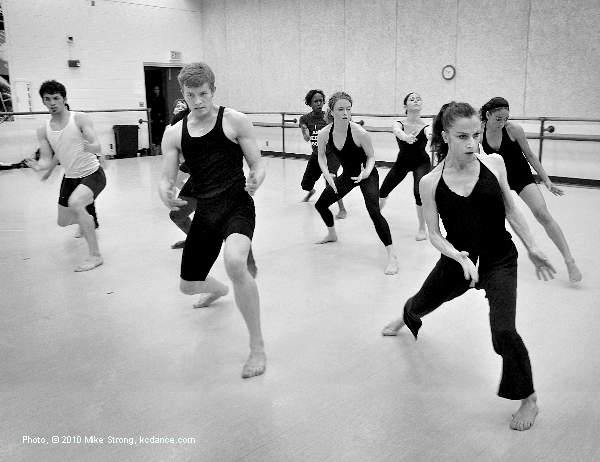
Desire by Gary Abbott - Studio Rehearsal - (left-right front)
Gavin Stewart, Michael Tomlinson, DeeAnna Hiett -
(in back) Tracey Franklin, Brittany Duskin, Kelanie Murphy, Chloe Abel -
(behind Gavin) Kathleen Turner - (behind Michael) Carolina Monnerat
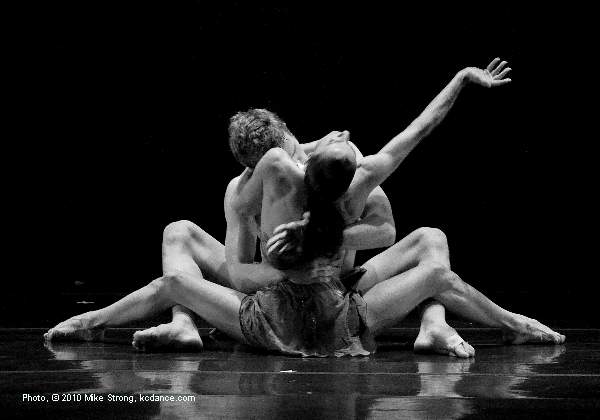
Michael Tomlinson and DeeAnna Hiett in Desire by Gary Abbott
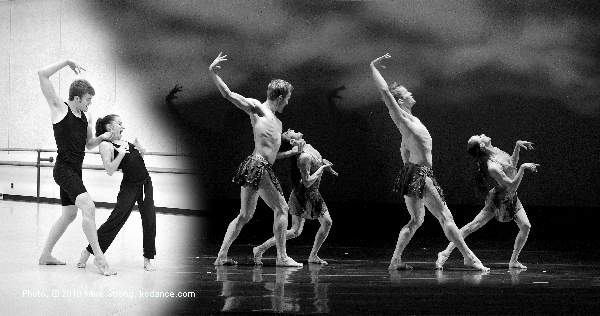
Studio rehearsal and theater performance - Desire by Gary Abbott
- Michael Tomlinson and DeeAnna Hiett
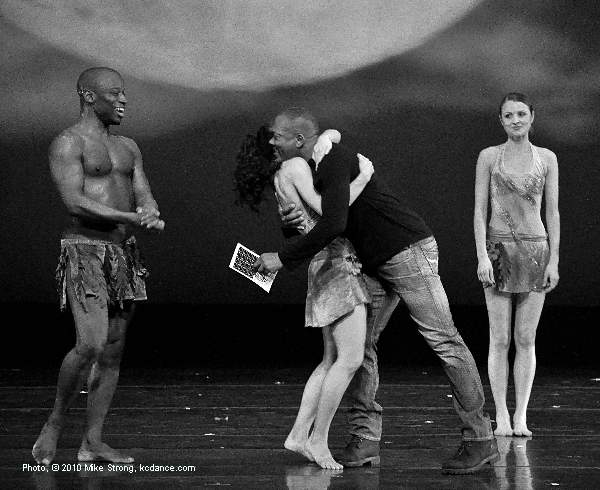
Gary Abbott, Associate Director of Deeply Rooted, in from Chicago
hugs Kathleen Turner after the performance of his piece, Desire. Left is Telly
Fowler and right is Skyler Taylor
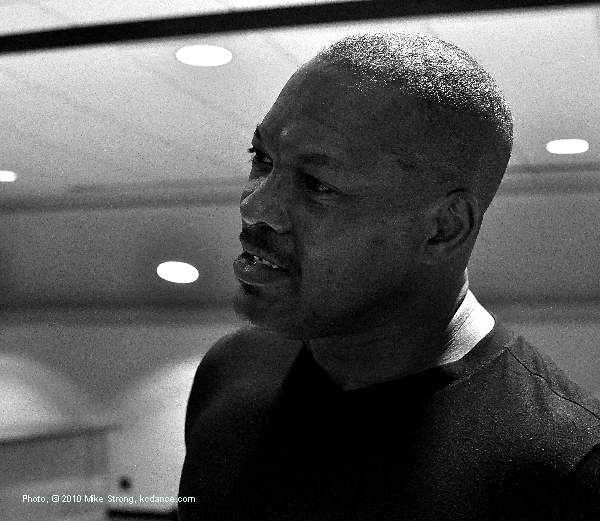
Gary Abbott from Deeply Rooted - Choreographer of "Desire"
in lobby of PAC just after performance of his piece
Telly Fowler and Kathleen Turner in "Desire" by Gary
Abbott
To Each Her Own - by Paula Weber
To Each Her Own by Paula Weber - Chloe Abel, Carol Monnerat, DeeAnna Hiett, Kathleen Turner, Britanny Duskin
With new pieces and a venue shift just down the hall in the Spencer Theater Wylliams /Henry is trying out a new look. Though there is some teething. Spencer Theater (630 seats in angled sections from the stage outward), unlike White Hall (600+ seats in three front to back rows), litterally at the opposite end of the front lobby, is set up for theater but not for dance. The dancers had a problem hearing the music until the speakers were moved during tech. However the height of the rigging allows taller sets and more room overall.
This spring's concert from Wylliams Henry looked a bit like a Deeply Rooted production. With a 1994 piece, Desire, from Deeply Rooted associate artistic director Gary Abbott and a flock of Deeply Rooted dancers. Wylliams/Henry has had a long collaboration with Deeply Rooted and includes Kevin Iega Jeff's "Naeemah's Room" "We Dance" (originally commissioned by Wylliams/Henry) and "Church of Nations" in the repertoire. Kevin Jeff is artistic director. Wylliams/Henry's own DeeAnna Hiett, long a mainstay dancer, is also a dancer and instructor with Deeply Rooted
Coming in to dance are Kathleen Turner who is D/R's dance education coordinator, Tracey Franklin who has danced with W/H for many seasons is DR's dance education director as well as a rehearsal director and instructor. Carolina Monnerat is a D/R rehearsal director, company member and instructor.
Dancers not in this show but who have danced with W/H in recent concerts and are also listed with D/R include Karah Abiog - now in the northwest, Drew Shuler and Dereque Whiturs.
Then there is an unusually large number of dancers who've recently graduated from the UMKC dance program- Erik Sobbe, Michael Tomlinson, Chloe Abel, Kelanie Murphy and Skyler Taylor. As in times past W/H is bringing along a couple of current UMKC dancers: Gavin Stewart, Brittany Duskin, and Whitney Ricketts.
Torens Johnson (Director of Dance at Paseo Academy of the Fine & Performing Arts) has become one of the go-to's for the comnpany. In Southern Exposure he takes the part of Mary Pat's childhood friend. The character in the dance is murdered in a racial hate crime. Torens does some truely amazing "flying" as his character is subjected to brutalization, and to being thrown into the air in spasms of violence. Although it was stage violence, choreographed, it is astonishing to see, especially as there are no hidden wires behind the set to jerk him up, back and around. Jess Akin, from the theater department worked on the fight choregraphy and also portrayed one of the
Stewart has been one of the busiest dancers in the area recently, barely keeping up with all the roles he is getting. He is also a guitar player, singer and media guy. Duskin is also dancing in various companies in the area and just came off performing in the UMKC spring concert as The Firebird in the new Josh Beamish ballet where she dominated attention in each of several short passes across the stage.
Dancers in the show: DeeAnna Hiett, Kathleen Turner, Tracey Franklin, Carolina Monnerat, Telly Fowler, Torens Johnsen, Christopher Peacock, Debbie Jacobs, Erik Sobbe, Michael Tomlinson, Chloe Abel, Kelanie Murphy and Skyler Taylor, Gavin Stewart, Brittany Duskin, and Whitney Ricketts, Rodni Williams, Paula Weber
My Usual == complaints about the amount of light - As a photographer and videographer I really do want more light. This show was just too dark through most of it to get the kind of shots I wanted and the company needed. But I am usually at the end of the food chain even though I'm expected to come up with some sort of magic to produce shots. When it is time to use those shots for publicitiy they get compared, unfavorably and unfairly, to the static shots taken in studio with tons of light from strobes and setting up the shot. It is a whale of a lot harder to get those shots in the moment, no second chances, lots of motion and downright dark.
What is confounding to me is that NY productions run with a lot of light, which is evident when they come through here, on the road. What is further confounding is that reducing the amount of light in the theater doesn't really make the place darker to human eyes, which adjust downward, but it is darker to cameras which can't adjust as far as human eyes. If you want a part of the stage to look black then you need to have another part of the stage light. Eyes adjust to the brightest part of a scene, rendering anything darker as if it is much darker. when light levels are too low much of the stage business and dance is lost to many of the audience, even to young eyes (from 20-somethings!), which makes little sense. Even less sense is losing the stage visibility to funders who tend to be older. Mood is set by relative amounts of light using comparisons, not by absolute low levels across the stage.
Here is what I propose. Arrange the light levels with a video camera at the optimum setting on the stage and plugged into a television for the display. Don't drop the lights lower than what the camera can pickup and display on a TV. Then shoot it without making any exposure changes on the camera, only zooming and framing.
That having been voiced and feeling elf-satisfied with myself, I lived through it all, got good video (would like better) and felt I had seen a major piece, one of several from Mary Pat Henry - Southern Exposure, Soiree, Intimate Conversations, Trains, Gates Bar-B-que - and that is just off the top of my head. Here is a choreographer who can stand toe-to-toe with anyone.
| ||
| Moore In Time | ||
| Choreography | Mary Pat Henry | |
| Music | Tan Dun | |
| Costumes | Antonia Ford Roberts | |
| Costume Constructon | Laura Powell | |
| Projections | Henry Moore | |
| Projections Design | Jeff Cady | |
| Lighting Design | EJ Reinagel | |
| Dancers | Kelanie Murphy, Gavin Stewart, Brittany Duskin, Telly Fowler, DeeAnna Hiett, Michael Tomlinson, Kathleen Turner, Tracy Kofford, Carolina Monerrat, Erik Sobbe, Chloe Abel | |
| PR Blurb | Multi media work inspired by the sculptures of Henry Moore. Dancers become kinetic images of abstract shapes and inter-related formations. Always with an emotional connection to each other the dancers run, leap and hurl themselves through space in daring lifts and breathtaking partnering set against video images of Henry Moore. | |
| To Each Her Own | ||
| Choreography | Paula Weber | |
| Music | Arvo Part and Giovanni Battista Pergolesi | |
| Lighting Design | EJ Reinagel | |
| Costume Design | Paula Weber | |
| Costume Construction | Kathleen Bradford | |
| Dancers | Chloe Abel, Brittany Duskin, DeeAnna Hiett, Carolina Monnerat, Kelanie Murphy, Kathleen Purcell Turner | |
| PR Blurb | A work for four women depicting the similarities of the women and the distinct differences in their personalities as they choose their paths that are ever changing revealing each individual and what they are made of. Starting in simple leotards, each woman as the dance progresses becomes their individual self and the characteristics of that self is apparent as they perform and the clothing that they chose to add | |
| Chloe-Christina | ||
| Choreography and Video | Ruth Barnes | |
| Music | Edgar Meyer (Mama) | |
| Costume | Missouri State University | |
| Dancer | Chloe Abel | |
| PR Blurb | Multi media work with choreography and video by Ruth Barnes. The starting point of Chloe-Christina is Andrew Wyeth’s painting Christina’s World. This mixed media solo pulls the observer in by synchronized live and recorded movement and challenges what the observer is seeing by disrupting the balance between the dance and the video image. | |
| URL | http://theatreanddance.missouristate.edu/facultyprofile.asp?ID=3 | |
| Desire (1994) | ||
| Choreography | Gary Abbott - co-director of Deeply Rooted Productions in Chicago | |
| Music | Hans Zimmer, Geoff McCormick and Simon Goldberg | |
| Costume Design | Gary Abbott | |
| Costume Construction | Kathy Bradford | |
| Dancers | Chloe Abel, Brittany Duskin, Tracey Franklin, Kathleen Turner, Telly Fowler, DeeAnna Hiett, Michael Tomlinson, Carolina Monnerat, Gavin Stewart, Kelanie Murphy (fri), Skyler Taylor (sat) | |
| PR Blurb | Portrays the attraction of individuals for each other. Three couples exchange glances, feel impulses of desire and love and the primal urge for a physical connection with each other | |
| URL | http://www.deeplyrootedproductions.org | |
| Southern Exposure | ||
| Choreography | Mary Pat Henry | |
| Music | pop music from the 60’s, social conscious jazz artists such as Nina Simone, gospel artists, and an original score , in collaboration with the Marrs Sound Archives | |
| Lighting Design | EJ Reinagel | |
| Costume Design | Antonia Ford-Roberts | |
| Technical Director | EJ Reinagel | |
| Set Design | Antonia Ford-Roberts | |
| Set Construction | EJ Reinagel | |
| Lighting Design | EJ Reinagel | |
| Assistant Lighting Designer | Brandon Clark | |
| Projection Design | Jeffrey Cady, Antonia Ford-Roberts (William Christenberry collection) | |
| Video Design | Jeffrey Cady | |
| Sound Design | Mary Pat Henry | |
| Sound Engineer | Jason Scheuffler | |
| Performers | ||
| Sister and Brother | Carolina Monnerat and Gavin Stewart | |
| Mother | Paula Weber | |
| Son | Torens Johnson | |
| Mother/Maid | Tracey Franklin | |
| Sheriff | Tracy Kofford | |
| Reverend | Rodni Williams | |
| Teenagers | Kathleen Purcell Turner, Chloe Abel, Telly Fowler, Michael Tomlinson, Erik Sobbe, Kelanie Murphy, Brittany Duskin, Skyler Taylor | |
| Actor | Rachel Nelson | |
| Guest Performers | Chris Peacock, Asha Singh, Whitney Ricketts, Debbie Jacobs, Jess Akin | |
| Southern Snapshots | ||
| Scene 1 | Cotton | |
| Scene 2 | Green Selley Up | |
| Scene 3 | Cocktail Party | |
| Scene 4 | Juke Joint | |
| Scene 5 | School | |
| Scene 6 | School Dance | |
| Scene 7 | Confrontation | |
| Scene 8 | Confrontation | |
| Scene 9 | Message | |
| Scene 10 | Church | |
| PR Blurb | Multi-media dance/ theater work inspired by the photographs and artwork of William Christenberry’s Klan Room. Drawing on those images and the memories of Mary Pat Henry, growing up the in South during desegregation, Southern Exposure asks us to question prejudice and look back to history to see who we were and who we are now. | |
| ||
| Artistic Directors | ||
| Artistic Director | Mary Pat Henry | |
| Co-Founder | Leni Wylliams | |
| Assistant Director | Paula Weber | |
| Rehearsal Directors | DeeAnna Hiett and Paula Weber | |
| Administrative Assistant | Chloe Abel | |
| Development Consultant | Paul Lerner | |
| Medi Consultant and Development Consultant | Kathy Hanis | |
| Marketing Consultant | Lorna Dempster | |
| Board of Directors | ||
| Interim-Chairman | Mary Pat Henry | |
| Vice-Chairman | David Donovan | |
| Secretary | Tiffany Sisemore | |
| Treasurer | Steve White | |
| Past Chairman | Kyle Danner | |
| Board | Paula Weber, Jasmine Abou-Kassem | |
| Advisory Board | Anthony Galvan Jr., Barbara Rafael, Robert Leipold, Carolyn Cameron, SuEllen Fried, Judy Roth | |
| Cast and Crew | ||
| Dancers | DeeAnna Hiett, Kathleen Turner, Tracey Franklin, Carolina Monnerat, Telly Fowler, Torens Johnsen, Christopher Peacock, Debbie Jacobs, Erik Sobbe, Michael Tomlinson, Chloe Abel, Kelanie Murphy and Skyler Taylor, Gavin Stewart, Brittany Duskin, and Whitney Ricketts, Rodni Williams, Paula Weber, Jess Akin | |
| Apprentices | Erik Sobbe, Michael Tomlinson, Kelanie Murphy and Skyler Taylor, Brittany Duskin | |
| Lighting Designer and Technical Director | EJ Reinagel | |
| Assistant Lighting Designer and Light Board Operator | Brandon Clark | |
| Sound Operator | Robert Beck | |
| Stage Manager | Victoria Frank | |
| Tech Crew | Corey McGlynn, Marisa Balbach, Jaime White, Asha Singh, Whitney Ricketts, Katelyn Sohl, Kevin Conway | |
| Website | Arthur Pemberton | |
| Graphic Design | Mark Ringenberg | |
| Photographers | Michael Manley and Michael Strong | |
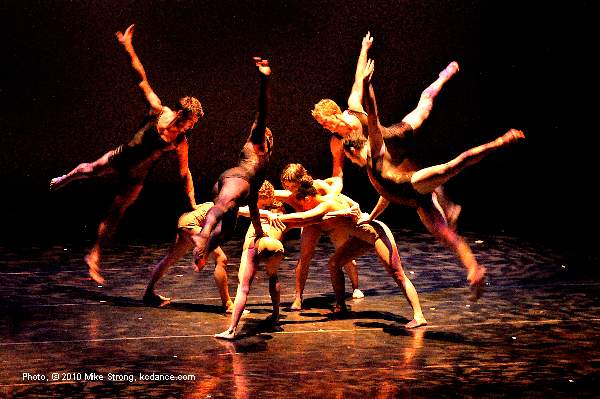
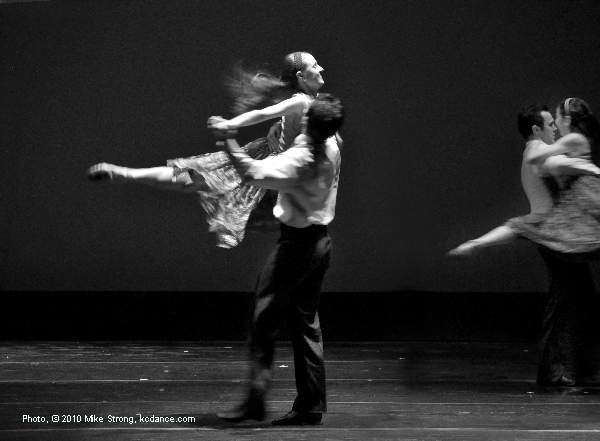
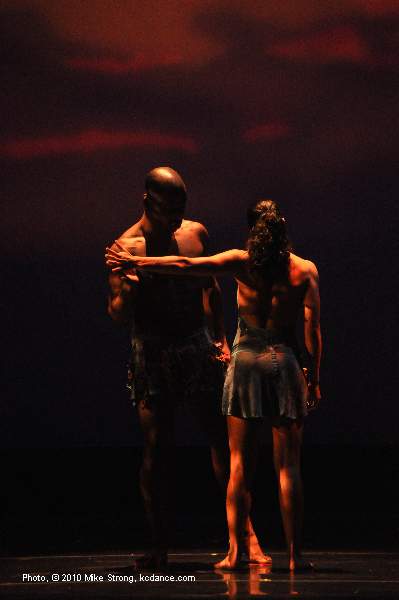
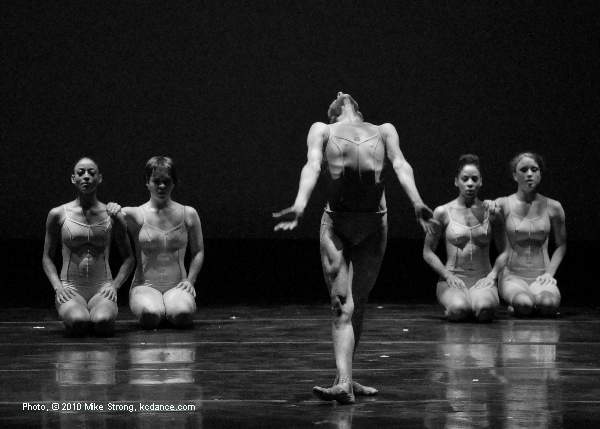
 Email This Page
Email This Page